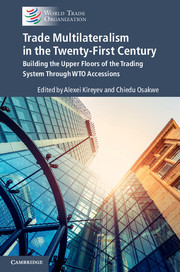 Trade Multilateralism in the Twenty-First Century
Trade Multilateralism in the Twenty-First Century from PART I - WTO Accessions and the New Trade Multilateralism
Published online by Cambridge University Press: 28 November 2017
Abstract
Accessions to the World Trade Organization (WTO) have profound implications for the private sector. The market liberalization required by accession commitments must be accompanied by deep structural reforms. Even though least-developed countries (LDCs) and developing countries usually benefit from special and differential treatment, the liberalization process can still lead to market adjustments that can test the status quo and require actions that will impact the private sector. This chapter discusses how the private and public sectors have cooperated to make the most of accession, while mitigating its risks. The chapter concludes that the business community values predictability. Therefore, acceding governments should find a way to integrate the private sector in the negotiating process. Gaining a thorough understanding of the objectives and implications of accession, in particular for small and medium-sized enterprises (SMEs), is a good starting point for building a partnership between the acceding government and its private sector. The acceding government should also seek consensus with the private sector on key accession commitments, on the direction of reform desired by stakeholders at the local level, and allow sufficient time to prepare the private sector to adjust to the expected changes in the business environment. The experience of recently acceded governments has shown that regular engagement with the private sector before, during and after accession enables new WTO members to make deeper liberalization commitments. When these commitments are the result of a consultative process between policy-makers and business, the likelihood of their successful implementation is greater.
WTO accessions have profound implications for the private sector. The market liberalization required by accession commitments needs to be accompanied by deep structural reforms in areas such as services, which have a direct impact on the private sector and its business environment. Even though least-developed countries (LDCs) and developing countries usually benefit from special and differential treatment, the liberalization process can still lead to market adjustments that test the status quo and require actions that will impact on the private sector.
The private sector in acceding governments has an interest in the provisions on transparency, non-discrimination and market access stability that form the core of the WTO agreements. Private sector stakeholders seek several and diverging objectives for the government to achieve in the WTO accession process. First, exporters seek increased and more predictable market access opportunities. Second, some stakeholders may seek protection for their nascent industry.
To save this book to your Kindle, first ensure [email protected] is added to your Approved Personal Document E-mail List under your Personal Document Settings on the Manage Your Content and Devices page of your Amazon account. Then enter the ‘name’ part of your Kindle email address below. Find out more about saving to your Kindle.
Note you can select to save to either the @free.kindle.com or @kindle.com variations. ‘@free.kindle.com’ emails are free but can only be saved to your device when it is connected to wi-fi. ‘@kindle.com’ emails can be delivered even when you are not connected to wi-fi, but note that service fees apply.
Find out more about the Kindle Personal Document Service.
To save content items to your account, please confirm that you agree to abide by our usage policies. If this is the first time you use this feature, you will be asked to authorise Cambridge Core to connect with your account. Find out more about saving content to Dropbox.
To save content items to your account, please confirm that you agree to abide by our usage policies. If this is the first time you use this feature, you will be asked to authorise Cambridge Core to connect with your account. Find out more about saving content to Google Drive.